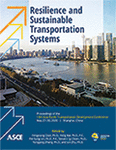13th Asia Pacific Transportation Development Conference
Development of the Autonomous Vehicle Trajectory on the Hilly Road Using Approaches of Eco-Operating Modes
Publication: Resilience and Sustainable Transportation Systems
ABSTRACT
This paper presented the development of a novel approach to generate the trajectory for an autonomous vehicle running on a hilly road using approaches of eco-operating modes to minimize the fuel consumption. The study analyzed the ecological approaches for the accelerating mode and the braking mode. First, the curvilinear function of the eco-accelerating mode was developed by analyzing the profiles optimized by the genetic algorithm. Then, the curvilinear function of the eco-braking mode was generated and proved to be effective by the mathematical method. In this development, the fuel consumption model based on the vehicle specific power (VSP) was implemented with road conditions obtained from digital road maps. Subsequently, the development scheme of the vehicle trajectory on the hilly road was proposed by using the eco-accelerating mode, the eco-braking mode, and the cruising mode. It was shown that compared with the fix speed drive (FSD) vehicle, the fuel savings of the ecological speed drive (ESD) vehicle were 1.8%, 3.9%, 4.5%, and 3.4% when running on an up slope, a down slope, an up-down slope, and a down-up slope, respectively. Finally, when the proposed approach was adopted on a simulation network, its ability to reduce the fuel consumption was analyzed under different traffic volumes and market penetration rates of ESD vehicles.
Get full access to this article
View all available purchase options and get full access to this chapter.
ACKNOWLEDGMENTS
The authors acknowledge the support from the National Key R&D Program of China (2018YFB1600700), and the Program of Henan Transportation Department (2018G3). The authors are thankful to all the personnel who either provided the technical support or assisted in the data collection and processing.
REFERENCES
Boriboonsomsin, K., and Matthew, J. B. (2009). “Impacts of road grade on fuel consumption and carbon dioxide emissions evidenced by use of advanced navigation systems.” Transportation Research Record: Journal of the Transportation Research Board, No. 2139, Transportation Research Board of the National Academies, Washington, D.C., 2139(2139), 21-30.
Barkenbus, J. N. (2010). “Eco-driving: an overlooked climate change initiative.” Energy Policy, 38(2), 762–769.
Chang, D.J. and Morlok, E.K. (2005). “Vehicle speed profiles to minimize work and fuel consumption.” Journal of Transportation Engineering, 131(3), 173-182.
Hellstrom, E., Aslund, J. and Nielsen, L. (2008). “Design of a well-behaved algorithm for on-board look-ahead control.” IFAC world Congress. Seoul, Korea.
Kamal, M. A. S., Mukai, M., Murata, J. and Kawabe, T. (2010). “Ecological driver assistance system using model based anticipation of vehicle- road-traffic information.” Journal of IET Intelligent Transport Systems, 4(4), 244-251.
Kamal, M. A. S., Mukai, M., Murata, J. et al. (2011). “Ecological vehicle control on roads with up-down slopes.” Int'l Transportation System, IEEE Transportation, 12(3), 783-794.
Kachroudi, S., Grossard, M., Abroug, N. (2012). “Predictive driving guidance of full electric vehicles using particle swarm optimization.” IEEE Transactions on Vehicular Technology, 61(9), 3909-3919.
Kamalanathsharma, R. K., and Rakha, H. (2013). “Multi-stage dynamic programming algorithm for eco-speed control at traffic signalized intersections.” Proc. 16th Int'l IEEE Ann Conyon Intel Transportation System ITSC, 2094-2099.
Li, Q., Chang, X., Cui, X., et al. (2011). “A road segment based vehicle emission model for real-time traffic GHG estimation.” Transportation Research Board 90th Annual Meeting. CD-ROM. Transportation Research Board of the National Academies, Washington, D.C.
Rakha, H., and Kamalanathsharma, R. K. (2011). “Eco-driving at signalized intersections using V2I communication.” 2011 14th International IEEE Conference on Intelligent Transportation Systems, ITSC. Washington, D.C.
Song, G. (2008). Study on the Traffic Fuel Consumption Model for the Traffic Strategy Evaluation. Ph.D. Dissertation. Beijing Jiaotong University, Beijing,
Sun, J., Niu, D., Chen, S. and Li, K. (2013). “Development and investigation of a dynamic eco-driving speed guidance strategy for signalized highway traffic.” Transportation Research Board 92nd Annual Meeting. Transportation Research Board of the National Academies, Washington, D.C.
U.S. Environmental Protection Agency. (2011). Development of Emission Rates for Light-duty Vehicles in the Motor Vehicle Emissions Simulator (MOVES2010), Final Report. EPA-420-R-11-011. Washington, D.C., USA.
Wu, G., Boriboonsomsin, K., Zhang, W. B., et. al. (2010). “Energy and emission benefit comparison of stationary and in-vehicle advanced driving alert systems.” Transportation Research Record: Journal of the Transportation Research Board, Washington, D.C., 2189(2189), 98-106.
Wu, C., Zhao, G. and Ou, B. (2011). “A fuel economy optimization system with applications in vehicles with human drivers and autonomous vehicles.” Transportation Research Part D Transportation and Environment, 16(7), 515-524.
Wang, J. Q., Yu, Q., Li, S. et al. (2014). “ECO speed optimization based on real-time information of road gradient.” Journal of Automotive Safety and Energy, 5(3), 257-262.
Wu, Y. P., Zhao, X., Rong, J., et al. (2015). “Potential of eco-driving in reducing fuel consumption and emissions based on a driving simulator.” Journal of Beijing University of Technology, 41(8), 1212-1218.
Yu, K., Yang, J. and Yamaguchi, D. (2015). “Model predictive control for hybrid vehicle ecological driving using traffic signal and road slope information.” Control Theory and Technology, 13(1), 17-28.
Information & Authors
Information
Published In
Resilience and Sustainable Transportation Systems
Pages: 725 - 733
Editors: Fengxiang Qiao, Ph.D., Texas Southern University, Yong Bai, Ph.D., Marquette University, Pei-Sung Lin, Ph.D., University of South Florida, Steven I Jy Chien, Ph.D., New Jersey Institute of Technology, Yongping Zhang, Ph.D., California State Polytechnic University, and Lin Zhu, Ph.D., Shanghai University of Engineering Science
ISBN (Online): 978-0-7844-8290-2
Copyright
© 2020 American Society of Civil Engineers.
History
Published online: Jun 29, 2020
Authors
Metrics & Citations
Metrics
Citations
Download citation
If you have the appropriate software installed, you can download article citation data to the citation manager of your choice. Simply select your manager software from the list below and click Download.
